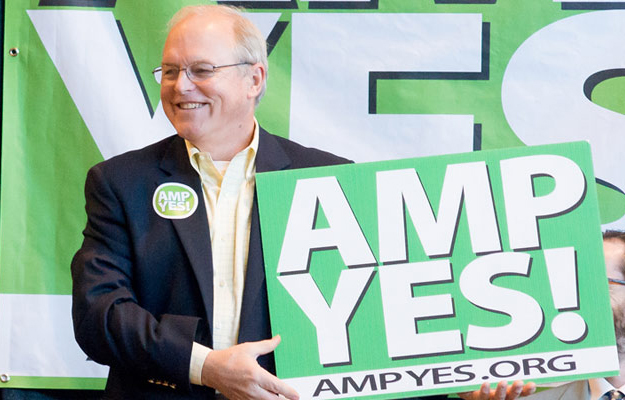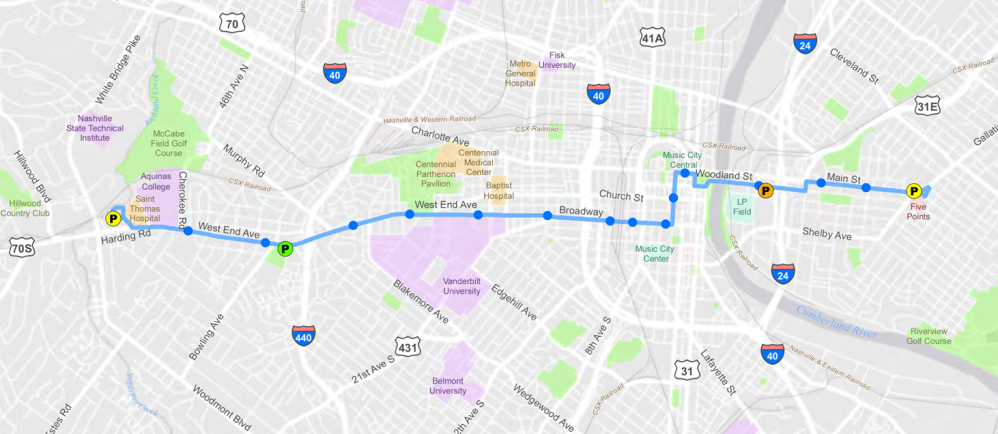
As feds OK funding, critical legislators move to block Nashville’s planned transit investment

Opponents in the Tennessee legislature have put forward an amendment designed to stop Nashville’s bus rapid transit line, eliciting howls of protest over legislative intervention in a local project previously approved by the state DOT.
Last updated: 4/12 1:24 p.m. at bottom. You may recall our profile of Nashville and it’s vision to get ahead of rapid growth by investing in bus rapid transit network. Nashville struggles with some of the worst congestion in the Southeast along with some of the longest peak-hour travel times in the nation.

That’s in part because the region’s economy has led the nation in rate of job growth. As population surges, metro leaders have been working to grow in a way that will continue attracting and retaining top-flight talent while avoiding the challenges that have plagued larger peers like Atlanta.
Their first big step toward a more sophisticated transit network is The Amp, an east-west line through the heart of the city that would connect diverse neighborhoods, major employers (including two hospitals and a university), and heavily visited tourist destinations.
Just last week they received the encouraging news that the Federal Transit Administration recommended $27 million in federal funding, the first installment of a potential $75 million match to state and local contributions.

That good news for supporters was overshadowed by an unexpected amendment explicitly crafted to require Nashville get the approval of the state legislature before being able to move ahead.
According to Nashville’s daily, The Tennessean, the amendment to a bill on crosswalk safety “says no rapid bus project in a metropolitan form of government, such as Nashville, could be built without the permission of the … General Assembly.”
In the same article, Nashville Mayor Karl Dean’s office called the move an “overreach” into a project that enjoys public and federal support. A followup piece further explored the issue of legislative intervention with Michael Skipper, executive director of the Nashville Metropolitan Planning Organization:
The Tennessee Department of Transportation is part of the MPO, which approved $4 million in Amp funding in December, and the governor or his designee sits on the agency’s board, Skipper said Friday.
“My position is that the project’s already approved by the state, and the governor’s concurrence is there,” he said. “These are typically executive branch decisions. …
“Giving the state legislature veto authority over projects that are already approved sort of undermines the federal law that requires the state and the locals to make these decisions together.”
The business community seemed to be shocked that the state would attempt to overrule local control on a plan that represents a key pillar of the local economic development strategy for a place so important to the state.
“You’ve got the largest regional economic contributor to this state, and it’s the only target of this limiting legislation,” said [Ralph] Schulz, president and CEO of the Nashville Area Chamber of Commerce. “It just doesn’t make sense.”
The amended crosswalk safety bill could move through the Tennessee legislature as early as Wednesday. The Amp coalition is urging supporters to make phone calls to their state representatives and the leadership to ensure that they hear all the voices from Nashville residents (see below.)
We’ll be keeping a close eye on what happens this week, but follow us on twitter @t4america for more regular updates.
UPDATED (4:57 p.m.) The Nashville Metropolitan Planning Organization and the Middle Tennessee Mayors Caucus sent a letter today to the chairs of the Tennessee House and Senate transportation committees letting them know that “mayors and county executives see the legislation as an overreach that reduces our ability to make local decisions,” urging them to reconsider “any legislation that would interfere with TDOT’s ability to work with local communities to plan and select projects, particularly those that advance infrastructure improvements aimed at managing congestion and fostering economic growth in metropolitan areas.”
Read the full letter here, also posted by The Tennessean. (pdf)
UPDATED 4/12 1:24 p.m. Another letter in opposition to the legislation was sent to the same state House and Senate committees from the mayors of the biggest four cities in Tennessee — Chattanooga, Knoxville, Memphis and Nashville — cities that collectively account for 80 percent of the state’s GDP and 91 percent of the state’s job growth over the last year.
This concentration of economic activity, in turn, generates important tax revenue that funds services and infrastructure in all corners of our state. We plan to continue to grow, prosper, and serve as the economic drivers of our great state. And in order to do that, we need the ability to make decisions about infrastructure solutions in our communities, especially in the area of transportation, as mass transit is the only long- term solution to the increasing traffic congestion that accompanies our economic growth.
Read the full letter. (pdf)



